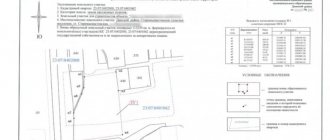Home / Real estate / Land / Provision
Back
Published: 01/21/2017
Reading time: 9 min
0
1653
The legislation regarding refusals to provide land plots is quite unclear. There are many inconsistencies and inaccuracies. So, for example, the Land Code of the Russian Federation regarding the grounds for refusal largely contradicts both federal legislation and most laws at the regional level.
When submitting an application, you should study the requested site to see whether it is located within a natural zone or a specially protected area, whether there are any restrictions on its circulation, or whether it is included in the administration’s master plans for the use of the territory under its jurisdiction.
In any case, the administration is obliged to give a reasoned refusal with reference to federal or local legislation. Any refusal can be subsequently appealed in court .
- Legislation
- Grounds for refusal to provide land
- Decision to refuse
- Procedure for appealing refusal to provide land
Grounds for refusal to use a plot of land
If the applicant is applying to purchase a plot owned by the local administration without holding a tender, then he should submit an application to the land management department.
This application will be considered by the administrative commission at public hearings, and an appropriate decision will be made on it.
In order for the decision to be positive, the applicant will need to collect a package of documentation that reflects the current circumstances that allow him to receive land without participating in bidding. The same reasons should be indicated in the application. At the discretion of the authorized commission, a positive or negative decision will be made on the application.
The grounds for refusal to use a land plot must comply with the provisions of Article 39.6 of the Land Code of the Russian Federation. These include the following reasons:
- A person applying for the acquisition of land plots without participating in the auction does not have such an advantage.
- The plot of land indicated in the application has already been transferred to a third party on the basis of permanent (perpetual) use or lifelong inheritable possession. Except in cases of contacting the municipality of the copyright holder of the site.
- The plot indicated in the application belongs to a garden partnership or other non-profit organization that unites landowners. Except in cases where an application was made by a member of the partnership.
- The plot indicated in the application is allocated under the land development program for individual housing construction. Except in cases where an application is submitted by a member of an NPO engaged in land development. Or – the founder of such an NPO.
- There is a permanent building on the site, including an unfinished one, owned by an individual or legal entity, or by the local executive committee. Except in cases where the owner of the building applies.
- The memory has been withdrawn from circulation or is limited in circulation.
- The memory is reserved for state or municipal needs.
- It is planned to carry out work of federal or municipal significance in the area where the allotment is located.
- The array, which includes this memory, was put up for auction, information about the lots was posted in accordance with the auction rules.
- Information about cadastral and technical characteristics does not coincide with the actual state of affairs.
Attention: A certain part of the land in the constituent entities of the Russian Federation must be allocated for entrepreneurship and provided only to persons participating in the program to support small and medium-sized businesses in accordance with Law No. 209-FZ of July 24, 2007.
Reasons for challenge in prior approval

In this case, he must rely on the norms of Article 39.15 of the Land Code of the Russian Federation. Refusal may occur in the presence of one of the following circumstances:
- The category of land in the array, the intended purpose and the type of permitted use of the land plot do not correspond to the goals of the applicant.
- The legal capacity of the person submitting the application does not comply with the law.
- Lack of proper registration of land by the administration.
- Lack of required information in the application or its inconsistency.
- The presence of technical or legal errors when drawing up the application.
- The need to clarify the boundaries of the land plot, other procedural shortcomings.
- Lack of Russian citizenship and registration in the locality where the land plot is located.
To allocate memory, you will need to create a diagram of the allocated areas. Without a schematic plan, drawn up on paper and approved by the head of the executive committee, the allocation of land plots is unacceptable. The plots must undergo land surveying.
Situation:
A citizen turned to us for help; the problem was that she could not register (privatize) a land plot, since no documents for it had been preserved.
Task:
Allocate a plot of land from municipal property to our client for free.
How we challenged the refusal to provide ownership of a plot of land for a residential building
Solution:
To begin with, it was necessary to determine what area the client is claiming and within what boundaries. To do this, we ordered from our cadastral engineer a layout diagram of the land plot showing the area and boundaries of the future land plot.
Scheme
The next stage of our work was the formation of an application for preliminary approval of the layout of the land plot with its subsequent submission.
Having attached the necessary package of documents to the application, we submitted the application to the administration.
For reference. The period for providing this service is 30 days.
After the expiration of the due date, we applied for the result, it turned out to be sad and we were given a refusal to obtain preliminary approval for the layout of the land plot.
The reason for the refusal was the planning and land surveying project developed in this territory for the construction of a high-speed trunk line.
In this situation, we had no choice but to appeal this refusal in court.
Important point! In disputes of this kind, the courts often side with municipal authorities.
Having prepared a statement of claim, attaching the administration’s refusal and all the necessary evidence, we filed it in court.
In the trial, our task was to prove to the court that the actions of the authorized body were not legal, and that our client had been using the land plot long before the approval of the planning and land surveying project.
To do this, we used old extracts from the BTI, which indicated that the land plot was provided to the first developer for the construction of a residential building back in the 50s of the last century.
As a result, despite disagreement with the defendant’s claim and his objections, the court took our arguments into account and granted the claim, obliging the administration to agree on our scheme.
The result of our work:
Recognize the decisions of the administration of Nizhny Novgorod represented by the Committee for the Management of City Property and Land Resources, the Ministry of Investment, Land and Property Relations of the Nizhny Novgorod Region to refuse preliminary approval for the provision of a land plot as illegal.
Link to the court decision here.
Performer of this project:
Kozlov Renat Grigorievich
Registration of a negative decision by the administrative commission
After submitting the application and the package of attached documentation, the materials are reviewed for preliminary approval no longer than 5 days . If the stage of preliminary approval of the provision of a land plot has been completed, the package of documentation is submitted to the administrative commission for consideration. If not, it is returned to the applicant with a reasoned decision to refuse.
According to the norms of clause 17 of Article 39.15 of the Land Code of the Russian Federation, such a document must be drawn up in writing, be justified and contain an exhaustive list of the reasons that led to the refusal. It must contain the following information:

- Details of the application received from the citizen with a list of attachments.
- Information about the person responsible for the accepted refusal to consider, indicating the position, surname and initials.
- Information about the applicant to whom the document is addressed.
- Reasons for refusal to accept an application for processing.
- Date of compilation, signature of the executor and the head of the land administration department.
If it moves forward, the issue will be considered by the administrative commission at a public hearing. The applicant can find out the date of the hearing and appear at the hearing. Upon consideration of his issue, a decision of the commission will be made, documented in the protocol. It will be issued in the form of an extract from the protocol on an issue concerning the applicant.
Information: A document with a refusal is issued only to the applicant against signature, upon presentation of a passport.
Appealing an illegal resolution - step-by-step instructions
The applicant can appeal the refusal after receiving an extract from the commission’s decision or on the basis of a certificate of refusal submitted at the preliminary approval stage. The appeal argument must be based on the provisions of Articles 39.14-39.17, 64 of the Land Code of the Russian Federation , in the event of an inadequate or unconvincing explanation of the reasons for the refusal. That is, an interested person applying for a land plot is obliged to:
- refute the grounds for refusal specified in the document;
- prove that his rights were violated by an unlawful negative decision;
- confirm your legal right to receive a loan.
You can appeal an illegal resolution in the administration of the locality or in court.
Petition with a complaint to the appropriate authority

The application is written to an authorized administration employee , depending on the status of the locality. This may be the head of the district or city administration or the deputy of the regional executive committee. The complaint states:
- The grounds on which the citizen applied for the provision of a lease and the grounds for the refusal received.
- The date of consideration of the issue at public hearings or the date of filing the application, if it has not received prior approval.
- Legislation, indicating the laws of the Land and Civil Codes that were violated when making an unlawful negative decision.
- Legal norms that should have guided the authorized official or commission making the decision.
- A concise description of the situation, brief explanations.
- Signature, date.
A complaint received must receive a response. It is also compiled in detailed form, with convincing evidence and reference to articles of the law. If here too a decision is made to reject the application, then further consideration of the issue is possible only in court.
Going to court
If the administration refuses to provide a land plot, then you must go to court within 10 days after receiving a negative resolution in response to the filed complaint. If during this period there is no appeal to the court, then the decision made by the administration that the applicant does not receive the allotment will come into force.
Important: If this deadline is missed for objective, valid reasons, it can be restored by filing an application with the court and attaching a document confirming the reason for the omission.
Which judicial authority should I contact if the administration refuses?

The general norms of the Civil Law Code (CCP) of the Russian Federation regarding claim proceedings also apply to these issues. Based on these provisions, you should contact the district or city court at the location of the administrative body that unlawfully refused the applicant’s legal request.
Drawing up a statement by the plaintiff
The statement of claim is drawn up in accordance with the provisions of Article 131 of the Code of Civil Procedure of the Russian Federation and consists of the following basic elements:
- "caps";
- title of the document;
- informational part;
- pleading part;
- dates, signatures and list of attachments.
The “header” indicates the name of the court to which the claim is being filed. Below, a column indicates information about the judge who accepted the claim and about the parties: the plaintiff and the defendant. The name of the document will be as follows: “Administrative claim regarding the adoption of an unlawful decision by the administration.”
Help: The title of the document should indicate the name of the municipal authority. And in the information about the defendant - the official responsible for making the decision.
Basic information is given in the informational part. They are similar to those included in the complaint for the administration. But here the claims against the administration are additionally set out, which are based on the unlawful decision of the executive committee to support the decision to refuse. If we consider the basic positions of this part, they may be as follows:
- when the complaint was filed with the administration;
- what motivated her negative decision on the issue;
- what legal norms were violated or not clarified;
- why the plaintiff believes that his rights have been violated.

Next comes the pleading part, which formulates a request that the court oblige the municipality to allocate the plot to the plaintiff legally, indicating the cadastral characteristics of the land plot. At the end, a date and signature are given, and a list of attachments is given.
Document attachment
Based on Article 132 of the Code of Civil Procedure of the Russian Federation, a package of documentation is attached to the statement of claim. The documents included in it are appendices and are included in a list in the statement of claim. It should include:
- Documentation confirming the right to receive an allotment without bidding (certificate of a large family, certificate of disability and other evidence of benefits).
- Refusal to provide the loan in the form of an extract from the minutes of the commission meeting or the results of preliminary approval.
- A copy of the complaint submitted to the administration.
- Extract from the administrative decision.
- Receipt of payment of the fee to the court.
Important: If instead of the person applying for the allotment, his representative acts, then he must have a notarized certificate with a list of actions that he is authorized to perform.
Costs for filing a claim
The costs of the state duty are paid by the plaintiff. If a court decision is made in his favor, he can ask the court to oblige the defendant to pay the costs of state fees. But in this case they are small, since the claim is non-property in nature. According to the norms of clause 2.2 of Article 333.21 of the Tax Code of the Russian Federation, for individuals they amount to 300 rubles.
On our website you will also find publications telling about the rules for using public land, loss of the right to use a plot, and also learn what a state act on the right to use land is.
Appealing the administration's response
There are situations when the person who contacts the administration is to blame for such a situation due to his inattention.
But there are situations of unfair refusal that need to be responded to. The administration's refusal can be appealed. For this purpose, a special procedure is provided, which is carried out within the walls of the institution or beyond.
Let's consider how to most effectively carry out the procedure for appealing a refusal. An appeal can be made in several ways:
- The first way to appeal is that you must contact the administration with a complaint in which you describe the current situation:
- In the header of the complaint, write in relation to which body the document was sent;
- further state the reasons that made you write such an appeal. For example, as a result of applying for papers to provide a land plot, you received a refusal for a reason that you do not consider justified.
- It is necessary to refer to legislative acts that, one way or another, confirm that you are right.
If the administration staff did not respond to the complaint, or left their decision to refuse unchanged, you can contact another authority. This is the court. In the district court, you can write a statement of claim, attach a document about the refusal to provide the allotment, and submit it for consideration to the court. Don't forget to pay the state fee. - Remember that the court may also refuse to consider you if it considers that your request is unlawful. However, if you were able to prove that you were right, then a court hearing will be scheduled, where you will directly encounter administration employees and will be forced to present arguments in your favor and against your opponents.
- Upon completion of the procedure, namely the court hearing, a decision will be made, which will become the basis for further actions in the form of formalizing the granting of an allotment, or a complete severance of relations between you and the administration.
We do not recommend completing the documents yourself. Save time - contact our lawyers by phone:
8 (800) 350-29-87
Where to contact?
As we mentioned above, you can contact one of two proposed bodies: the administration with a complaint or the court with a statement of claim. However, you cannot contact the latter authority unless you have filed a complaint with the administration .
How to make an application?
The application for appeal is drawn up on the basis of a sample that should be available to the administration. Therefore, do not be lazy to come to the secretariat and ask for a sample form of such a document.
In addition, you can independently consider how such a document is compiled on the Internet, and try to do it yourself at home. Sometimes it is worth resorting to the help of a professional lawyer.
The basic rules of design are adherence to literacy, punctuation, clear presentation of thoughts, as well as correct filling.
Cost and terms
To apply to the court and the administration, you will have to pay a state fee of 300 rubles . This is a very small expense.
If we talk about deadlines, the consideration of the complaint and application for appeal must be completed within 14 working days, which means that after two to three weeks you will receive a concrete result.
The court can consider your claim within one calendar month, and then, in fact, accept the case for proceedings or refuse you.









